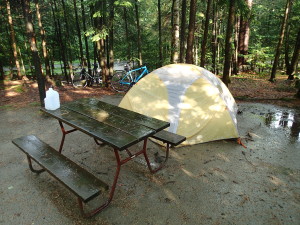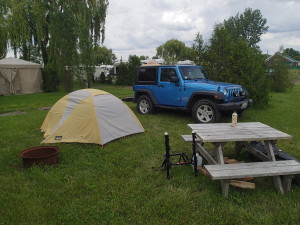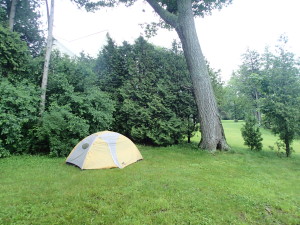I like to think of myself as a pretty low-maintenance kind of chick. I can put up with less-than-ideal road trip conditions, and I don’t mind skipping showers for a few days if I’m doing something cool.
However like most women, I have a gazillion health and body products crammed on my bathroom shelves back home. When I reluctantly return to home base after a month of living on the road, I find myself using face creams and eyeliners I’d completely forgotten about.
While living out of a tent and the back of a Jeep for extended periods of time, I’ve learned a thing of two about what to bring along and what to leave behind in the medicine cabinet. Even low-maintenance chicks, like me, tend to over-pack, so here’s some miscellaneous advice to help you avoid repeating my mistakes.
Bring This Stuff
- Face wash & lotion – You might think you can get by with combined body/face wash, but once your eyes start stinging, you’ll thank me. Your skin condition will inevitably suffer in the outdoors over time, so stock up on mini hotel lotions when you can and shove a bunch in your bag.
- Dry shampoo – Showers can be hard to come by and this stuff can make you feel a bit less greasy.
- Makeup foundation – Your skin will likely break out and look like crap within a week. Although you’ll likely spend most your days makeup free, sometimes you just feel better glancing at an evener complexion in the mirror. Feel less silly about wearing it by bringing a foundation with SPF 15 or 30.
- Floss and mouthwash – You might think flossing and swishing are a hassle, but with infrequent brushing, your teeth will get really nasty really quick. Without the distractions of television and abundant social plans, you’ll have more time to floss in the evenings, whether it’s in the campground bathroom or your car’s rear view mirror.
- Prescription sunglasses – Contact lenses and living in the outdoors don’t mix very well. Your hands will often be dirty and your eyes will be stinging from blowing dust in the wind. Prescription sunglasses are expensive, but if your eyes suck and you spend a lot of time outdoors, they’re worth it.
- Bandanas – Just get used to it…your hair isn’t going to look very good very often. My hair is naturally wavy, meaning it’s always frizzy when I’m living outdoors. My advice is to start a bandana collection. Not only do bandanas keep the hair out of your face, they also make you look hardcore and they’re a fun souvenir to seek out, especially at national parks.
Leave This Stuff Behind
- All hair tools – As hard as it is to leave the blow dryer at home, trust me…you won’t use it. If you’re serious about outdoor activity, your hair will usually be pulled back or tucked inside a hat of some sort. Outlets can be a sparse commodity in campgrounds, and the other campers will silently judge you for being vain.
- Nail polish and remover – Before leaving on a long road trip, remove all of your fingernail and toenail polish. It will soon chip away and bother the crap out of you. I’ve never seen a travel-size bottle of nail polish remover, so save room in your bag and avoid potential acetone-soaked spills.
- Eye makeup – It’s common knowledge that leaving eye makeup on when you sleep is a bad idea. You won’t have a nice sink to wash your face in if you’re backcountry camping, so skip the eye makeup and leave the remover at home too. Having long lashes on a hiking trail isn’t worth a nasty eye infection.
See, that’s not so bad! I even gave you twice as many things to take than things to leave behind just so you aren’t turned off by the idea of long-term camping!
 But seriously, living in the outdoors for more than just a weekend here and there is a really rewarding experience that clues you in on things you didn’t even know about yourself (or your travel companion, for that matter). For example, I learned that I’m cool with camping until it hits twenty degrees. Once the mercury dips into the teens, I’m ready to check into a hotel. While my boyfriend is more okay with cold temperatures, he can’t stand a damp tent or temperatures over eighty-five degrees.
But seriously, living in the outdoors for more than just a weekend here and there is a really rewarding experience that clues you in on things you didn’t even know about yourself (or your travel companion, for that matter). For example, I learned that I’m cool with camping until it hits twenty degrees. Once the mercury dips into the teens, I’m ready to check into a hotel. While my boyfriend is more okay with cold temperatures, he can’t stand a damp tent or temperatures over eighty-five degrees.
We all have our breaking points. But with the essential (not excessive) comforts of home, we can feel a little more prepared to tackle the challenges that bring us to closer to them.


